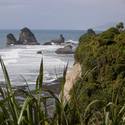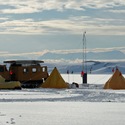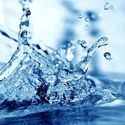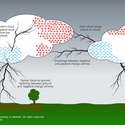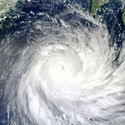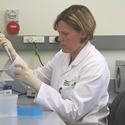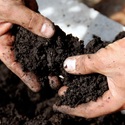Position: Former Adjunct Senior Research Fellow, University of Waikato.
Field: Soils in Antarctica.
Dr Megan Balks didn't know what she wanted to do once she left school but her interest in science led her to enrol at Massey University to do a BSc degree. She thought this might lead into teaching secondary school maths and physics, or maybe a job in a carbon1 dating laboratory. At Massey, she got very interested in Earth Sciences, which was taught in the Soil Science department. She found soils and geology2 so interesting that she decided to make soil science her major.
Once Megan finished her degree, she got her first a job as a soil scientist3 with DSIR (now known as Manaaki Whenua4 – Landcare Research) in Dunedin, working on soil surveys in the Central Otago region. She later moved to Hamilton, where worked as a half-time assistant lecturer at the University of Waikato while completing her PhD5 degree on irrigation of effluent6 onto soils (which is often a better option than discharging effluent to a river or the sea).
Megan went on to teach soil and environmental science at Waikato for 30 years. An opportunity to travel to Antarctica with some of her former colleagues from the DSIR led to her ongoing research work in Antarctica – she has had 19 field trips to the ice since 1990 and supported 10 graduate students from University of Waikato in Antarctic soils research.
International collaborations
For her Antarctic research work, Megan collaborated with scientists from many other countries and now has friends all over the world. Her work has taken her to conferences and visits to other researchers in Russia, China, United States, Thailand and Switzerland.
Megan has been involved in the establishment and management of a network of Antarctic soil/permafrost climate7 monitoring stations in collaboration8 with Manaaki Whenua – Landcare Research and the United States Department of Agriculture. The climate station data9 contributes to the Circumpolar Active Layer Monitoring (CALM) network.
From 2000 until 2023 Megan was a part of the Cryosol Working Group of the International Union of Soil Sciences, including two years as co-Chair.
She was a founding member and secretary of the Antarctic Permafrost and Soils (ANTPAS) group – an international group bringing Antarctic soil and permafrost researchers together, working towards a common goal of establishing a co-ordinated soil map of the entire Antarctic Continent and coordinating soil and permafrost temperature10 data collection.
Nature of science
One of the myths of the nature of science11 is that science is a solitary pursuit. In reality, only rarely does a scientific idea arise in the mind of an individual scientist to be validated by the individual alone and then accepted by the scientific community12. The process of science is much more often the result of collaboration of a group of scientists.
In additional to her international work, Megan has been a member of the Royal Society of New Zealand’s Committee on Antarctic Research, the New Zealand Geographic Board Committee of Place Naming in the Ross Sea Region of Antarctica, and also President of the New Zealand Society of Soil Science from 2018 to 2020.
As of 2023 Megan is working with the Food and Agricultural Organisation of the United Nations, as a review editor on the State of the World Soils Report due for release in 2025.
Outside work
Megan owns a small hill country sheep farm, which includes over 20 ha of QEII covenanted forest. From there, she persues her interests in wool crafts, landscape art, photography and geology.
Read more about soil scientists at work and see Megan's soil-related tapestry artworks, using fibre from her sheep.
In addition to her numerous publications, she co-authored the award-winning textbook The Soils of Aotearoa New Zealand in 2021, which includes coverage of the Ross Sea Region.
Megan was awarded the New Zealand Antarctic Medal for services to Antarctic soil science in the 2024 New Year Honours List.
Related content
Find out more about Megan's work in Antarctica in these articles:
Useful links
Listen to Dr Megan Balks talk about her career and life in this extensive interview on YouTube from Manaaki Whenua – Landcare Research.
Find out more about The Soils of Aotearoa New Zealand.
In this NZ Herald article read about how Megan's services to soil led to her 2024 New Year Honour.
This article is based on information current in 2007 and 2024.
- carbon: A non-metal element (C). It is a key component of living things.
- geology: Study of the origin, history and structure of the Earth; the geological features of an area.
- soil scientist: A scientist who studies soil, looking at a variety of aspects from the chemistry and form of soil to environmental protection and resource planning.
- whenua: Land.
- PhD: Abbreviation of Doctor of Philosophy – a degree normally obtained after a concentrated period of research. This is the highest level of degree that involves supervision by academic staff at a university.
- effluent: The outflowing of water from a system – often refers to the discharge of sewage, but can also be natural, for example, the outflowing of a river to the sea. Agricultural effluent refers to the treated and untreated wastewater collected during the management of livestock.
- climate: The weather conditions of an area averaged over a series of years, usually 30 or more.
- collaboration: Working together with a common purpose.
- data: The unprocessed information we analyse to gain knowledge.
- temperature: A measure of the degree of hotness or coldness of an object or substance. Temperature is measured with a thermometer calibrated in one or more temperature scales. Kelvin scale temperature is a measure of the average energy of the molecules of a body.
- nature of science: The Nature of Science (NoS), is an overarching and unifying strand of the New Zealand science curriculum. Through it, students develop the skills, attitudes and values to build a foundation for understanding the world around them – understanding how science works in order to make links between scientific knowledge and everyday decisions and actions.
- scientific community: The total body of scientists, their relationships and interactions.




